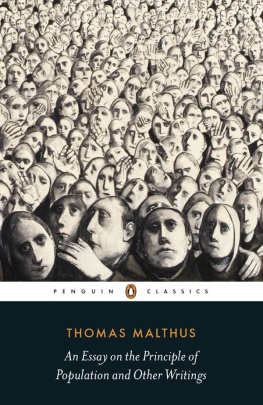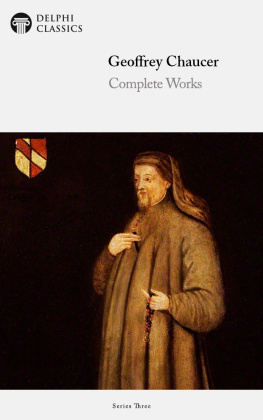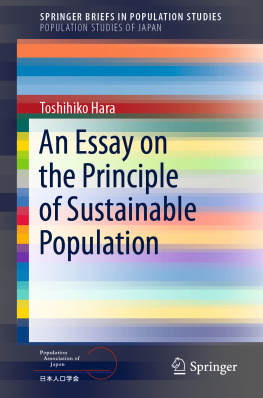Gilbert Geoffrey - An Essay on the Principle of Population
Here you can read online Gilbert Geoffrey - An Essay on the Principle of Population full text of the book (entire story) in english for free. Download pdf and epub, get meaning, cover and reviews about this ebook. City: New York, year: 2004, publisher: Oxford University Press, genre: Science. Description of the work, (preface) as well as reviews are available. Best literature library LitArk.com created for fans of good reading and offers a wide selection of genres:
Romance novel
Science fiction
Adventure
Detective
Science
History
Home and family
Prose
Art
Politics
Computer
Non-fiction
Religion
Business
Children
Humor
Choose a favorite category and find really read worthwhile books. Enjoy immersion in the world of imagination, feel the emotions of the characters or learn something new for yourself, make an fascinating discovery.

- Book:An Essay on the Principle of Population
- Author:
- Publisher:Oxford University Press
- Genre:
- Year:2004
- City:New York
- Rating:5 / 5
- Favourites:Add to favourites
- Your mark:
- 100
- 1
- 2
- 3
- 4
- 5
An Essay on the Principle of Population: summary, description and annotation
We offer to read an annotation, description, summary or preface (depends on what the author of the book "An Essay on the Principle of Population" wrote himself). If you haven't found the necessary information about the book — write in the comments, we will try to find it.
An Essay on the Principle of Population — read online for free the complete book (whole text) full work
Below is the text of the book, divided by pages. System saving the place of the last page read, allows you to conveniently read the book "An Essay on the Principle of Population" online for free, without having to search again every time where you left off. Put a bookmark, and you can go to the page where you finished reading at any time.
Font size:
Interval:
Bookmark:

Great Clarendon Street, Oxford OX2 6DP
Oxford University Press is a department of the University of Oxford. It furthers the Universitys objective of excellence in research, scholarship, and education by publishing worldwide in
Oxford New York
Auckland Bangkok Buenos Aires Cape Town Chennai
Dar es Salaam Delhi Hong Kong Istanbul Karachi Kolkata
Kuala Lumpur Madrid Melbourne Mexico City Mumbai Nairobi
So Paulo Shanghai Singapore Taipei Tokyo Toronto
Oxford is a registered trade mark of Oxford University Press
in the UK and in certain other countries
Published in the United States
by Oxford University Press Inc., New York
Introduction, Note on the Text, Select Bibliography,
Chronology, Explanatory Notes
Geoffrey Gilbert 1993
The moral rights of the author have been asserted
Database right Oxford University Preaa (maker)
First published as a Worlds Classics paperback 1993
Reissued as an Oxford Worlds Classics paperback 1999
Reprinted with revisions 2004
All rights reserved. No part of this publication may be reproduced, stored in a retrieval system, or transmitted, in any form or by any means, without the prior permission in writing of Oxford University Press, or as expressly permitted by law, or under terms agreed with the appropriate reprographics rights organizations. Enquiries concerning reproduction outside the scope of the above should be sent to the Rights Department, Oxford University Press, at the address above
You must not circulate this book in any other binding or cover and you must impose this same condition on any acquirer
British Library Cataloguing in Publication Data
Data available
Library of Congress Cataloging in Publication Data
Malthus, T. R. (Thomas Robert), 17661834.
An essay on the principle of population / Thomas Malthus: edited
with an introduction by Geoffrey Gilbert.
p. cm.(Oxford worlds classics)
Includes bibliographical references.
1. Population. I. Gilbert, Geoffrey. II. Title. ID. Series.
HB861.E7 1993 304.620 9311126
ISBN 0192837478
7
Printed in Great Britain by
Clays Ltd., St Ives plc
OXFORD WORLDS CLASSICS
For over 100 years Oxford Worlds Classics have brought readers closer to the worlds great literature. Now with over 700 titlesfrom the 4,000-year-old myths of Mesopotamia to the twentieth centurys greatest novelsthe series makes available lesser-known as well as celebrated writing.
The pocket-sized hardbacks of the early years contained introductions by Virginia Woolf, T. S. Eliot, Graham Greene, and other literary figures which enriched the experience of reading. Today the series is recognized for its fine scholarship and reliability in texts that span world literature, drama and poetry, religion, philosophy and politics. Each edition includes perceptive commentary and essential background information to meet the changing needs of readers.
Refer to to navigate through the material in this Oxford Worlds Classics ebook. Use the asterisks (*) throughout the text to access the hyperlinked Explanatory Notes.
OXFORD WORLDS CLASSICS

THOMAS MALTHUS

Edited with an Introduction and Notes by
GEOFFREY GILBERT

OXFORD WORLDS CLASSICS
AN ESSAY ON THE PRINCIPLE OF POPULATION
THOMAS ROBERT MALTHUS was born in 1766 to a cultured, middle-class family in the rural south of England. He was privately tutored to the age of 18, then enrolled at Jesus College, Cambridge, where he studied mathematics, science, and the classics. At graduation in 1788 he was Ninth Wrangler (ninth best mathematician) of his class. Shortly thereafter he was ordained in the Church of England and made curate of a chapel in Surrey. Publication of the Essay on the Principle of Population in 1798 brought him immediate fame. Several years of travel and research enabled him to produce a new, much-expanded edition of the work in 1803. Controversial from the start, the Essay marks a milestone in the history of economics, population studies, and social thought. Malthus wrote several other works of economics, notably An Inquiry into the Nature and Progress of Rent (1815) and Principles of Political Economy (1820). The latter anticipated by over a century Keyness macro-economic concern about stagnation in the capitalist economy.
Malthus did not marry until the age of 38 but eventually had three children, none of whom left descendants. In 1805 he became a professor of economics and history at the East India College in Hertfordshire, a position he held for the rest of his life. He was an original member of the Political Economy Club in London (1821), was elected a Fellow of the Royal Society (1818), and twice testified before Parliament. He died in 1834 while on a visit to his father-in-law in Bath, and is buried at Bath Abbey.
GEOFFREY GILBERT is Professor of Economics at Hobart and William Smith Colleges, Geneva, New York. A graduate of Dartmouth College and The Johns Hopkins University, he is the editor of Malthus: Critical Responses (Routledge, 1998).
Every year the worlds human numbers increase by a figure equal to the combined populations of Bolivia, Canada, Cambodia, Sweden, and Zambiaover 70 million people. With world population already past the six billion mark, several more decades of growth are virtually locked in by the youthful age structure of the worlds present population. Demographers estimate, for example, that even if the fertility rate in India continues its decline of recent years, that nation will add more than half a billion people to its population by the middle of the century.
The prospect of nine billion people worldwide by the year 2050a recent UN estimatemight be a matter of indifference, even celebration, if one could anticipate that most of the nine billion would be living at least as well as their parents and grandparents had lived, in a natural environment no more degraded than it is today. Demographic optimistsand such there are, as we shall seeargue that these are reasonable prospects. But there is a long tradition of concern and apprehension about the consequences of rising population, a tradition that dates from the publication of Malthuss Essay on Population in 1798. An undisputed classic of social thought, the Essay has put successive generations on notice that if no other causes intervene to hold population in check, sickly seasons, epidemics, pestilence, and plague [will] advance in terrific array, and sweep off their thousands and ten thousands (p. 61).
In the late 1790s Thomas Robert Malthus was the Anglican parson of a small country church, a bachelor in his early thirties who probably spent much of his time at his parents home. At some point he and his father got into a friendly argument over the future course of society. Daniel Malthus followed the French thinkers Condorcet and Rousseau and the English anarchist William Godwin in the conviction that society was on a path toward perfection. Political, social, and scientific developments were opening new avenues of advancement on all sides, and the further progress of mankind seemed virtually assured. This buoyant prospect, however, the younger Malthus could not bring himself to accept, for a reason announced in the title of his hastily but brilliantly written pamphlet,
Next pageFont size:
Interval:
Bookmark:
Similar books «An Essay on the Principle of Population»
Look at similar books to An Essay on the Principle of Population. We have selected literature similar in name and meaning in the hope of providing readers with more options to find new, interesting, not yet read works.
Discussion, reviews of the book An Essay on the Principle of Population and just readers' own opinions. Leave your comments, write what you think about the work, its meaning or the main characters. Specify what exactly you liked and what you didn't like, and why you think so.











